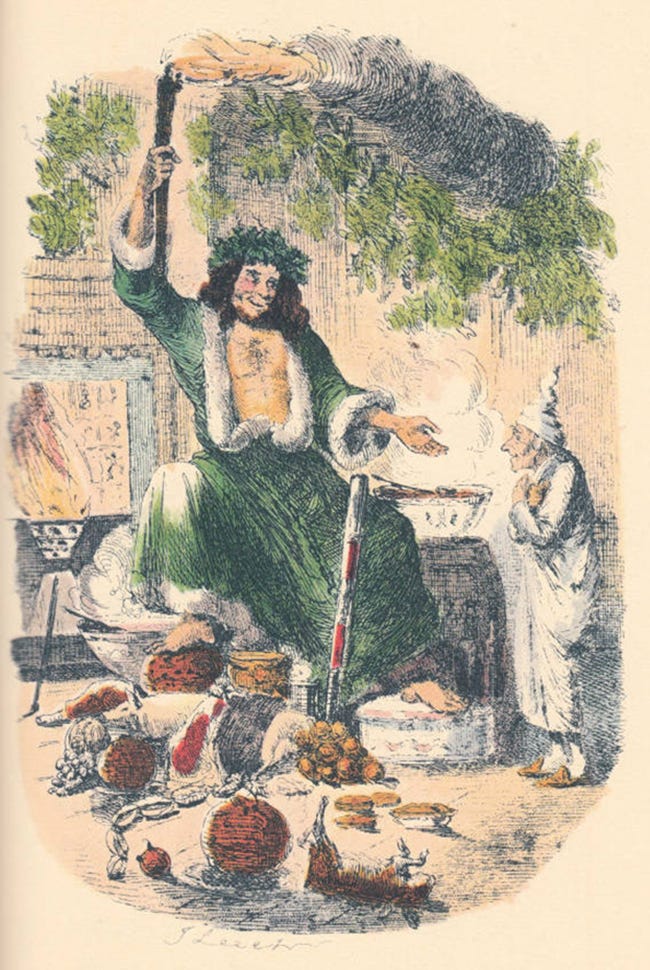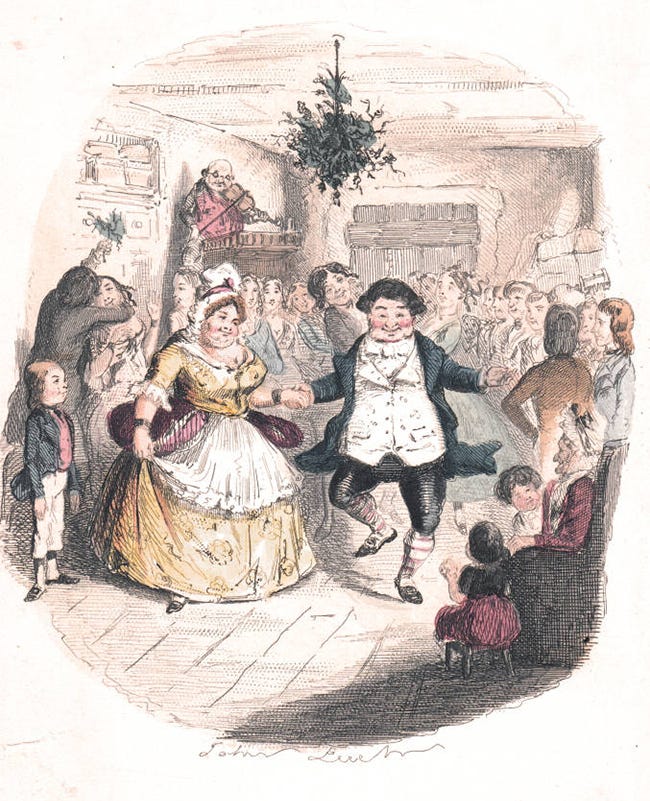Tiny Tim
Dickens's classic tale for the Christmas season contains a moving portrayal of a disabled child. We give you this excerpt to mark UK Disability Month
Charles Dickens, A Christmas Carol
The Story So Far…
The miserly Ebenezer Scrooge is visited by the Ghost of Christmas Past, the Ghost of Christmas Present, and the Ghost of Christmas Yet to Come—who aim to transform his parsimonious qualities to those more appropriate to the season: kindness, generosity, and selflessness. In this scene, the Ghost of Christmas Present has fantastically whisked Scrooge away to observe the celebrations of his underpaid employee, Bob Cratchit.
Now read on…
It was a remarkable quality of the Ghost (which Scrooge had observed at the baker’s), that notwithstanding his gigantic size, he could accommodate himself to any place with ease; and that he stood beneath a low roof quite as gracefully and like a supernatural creature, as it was possible he could have done in any lofty hall.

And perhaps it was the pleasure the good Spirit had in showing off this power of his, or else it was his own kind, generous, hearty nature, and his sympathy with all poor men, that led him straight to Scrooge’s clerk’s; for there he went, and took Scrooge with him, holding to his robe; and on the threshold of the door the Spirit smiled, and stopped to bless Bob Cratchit’s dwelling with the sprinkling of his torch. Think of that! Bob had but fifteen “Bob” a-week himself; he pocketed on Saturdays but fifteen copies of his Christian name; and yet the Ghost of Christmas Present blessed his four-roomed house!
Then up rose Mrs. Cratchit, Cratchit’s wife, dressed out but poorly in a twice-turned gown, but brave in ribbons, which are cheap and make a goodly show for sixpence; and she laid the cloth, assisted by Belinda Cratchit, second of her daughters, also brave in ribbons; while Master Peter Cratchit plunged a fork into the saucepan of potatoes, and getting the corners of his monstrous shirt collar (Bob’s private property, conferred upon his son and heir in honour of the day) into his mouth, rejoiced to find himself so gallantly attired, and yearned to show his linen in the fashionable Parks. And now two smaller Cratchits, boy and girl, came tearing in, screaming that outside the baker’s they had smelt the goose, and known it for their own; and basking in luxurious thoughts of sage and onion, these young Cratchits danced about the table, and exalted Master Peter Cratchit to the skies, while he (not proud, although his collars nearly choked him) blew the fire, until the slow potatoes bubbling up, knocked loudly at the saucepan-lid to be let out and peeled.
“What has ever got your precious father then?” said Mrs. Cratchit. “And your brother, Tiny Tim! And Martha warn’t as late last Christmas Day by half-an-hour?”
“Here’s Martha, mother!” said a girl, appearing as she spoke.
“Here’s Martha, mother!” cried the two young Cratchits. “Hurrah! There’s such a goose, Martha!”
“Why, bless your heart alive, my dear, how late you are!” said Mrs. Cratchit, kissing her a dozen times, and taking off her shawl and bonnet for her with officious zeal.
“We’d a deal of work to finish up last night,” replied the girl, “and had to clear away this morning, mother!”
“Well! Never mind so long as you are come,” said Mrs. Cratchit. “Sit ye down before the fire, my dear, and have a warm, Lord bless ye!”
“No, no! There’s father coming,” cried the two young Cratchits, who were everywhere at once. “Hide, Martha, hide!”
So Martha hid herself, and in came little Bob, the father, with at least three feet of comforter exclusive of the fringe, hanging down before him; and his threadbare clothes darned up and brushed, to look seasonable; and Tiny Tim upon his shoulder. Alas for Tiny Tim, he bore a little crutch, and had his limbs supported by an iron frame!
“Why, where’s our Martha?” cried Bob Cratchit, looking round.
“Not coming,” said Mrs. Cratchit.
“Not coming!” said Bob, with a sudden declension in his high spirits; for he had been Tim’s blood horse all the way from church, and had come home rampant. “Not coming upon Christmas Day!”
Martha didn’t like to see him disappointed, if it were only in joke; so she came out prematurely from behind the closet door, and ran into his arms, while the two young Cratchits hustled Tiny Tim, and bore him off into the wash-house, that he might hear the pudding singing in the copper.
“And how did little Tim behave?” asked Mrs. Cratchit, when she had rallied Bob on his credulity, and Bob had hugged his daughter to his heart’s content.
“As good as gold,” said Bob, “and better. Somehow he gets thoughtful, sitting by himself so much, and thinks the strangest things you ever heard. He told me, coming home, that he hoped the people saw him in the church, because he was a cripple, and it might be pleasant to them to remember upon Christmas Day, who made lame beggars walk, and blind men see.”
Bob’s voice was tremulous when he told them this, and trembled more when he said that Tiny Tim was growing strong and hearty.
His active little crutch was heard upon the floor, and back came Tiny Tim before another word was spoken, escorted by his brother and sister to his stool before the fire; and while Bob, turning up his cuffs—as if, poor fellow, they were capable of being made more shabby—compounded some hot mixture in a jug with gin and lemons, and stirred it round and round and put it on the hob to simmer; Master Peter, and the two ubiquitous young Cratchits went to fetch the goose, with which they soon returned in high procession.
Such a bustle ensued that you might have thought a goose the rarest of all birds; a feathered phenomenon, to which a black swan was a matter of course—and in truth it was something very like it in that house.
What we love about this story…
Dickens’s close attention to minute details is enrapturing, and we love his focus on aspects of the story such as the ‘remarkable quality’ of the Ghost that allows him to change his size at ease and the gown of Mrs. Cratchit that is worn, but, as Dickens memorably puts it, ‘brave in ribbons.’ Despite their poverty, the Cratchits’ spirits are so full that their goose almost seems to transform into a nicer, more expensive bird.
This is also the scene in which the reader first sees Tiny Tim, who walks with a crutch and whose limbs are supported by an iron frame. These touches allow for a powerful parallel between the healings recounted in the Bible and this image of the Cratchit family. They also suggest Dickens’s interest, along with a number of other Victorian writers, in the ways in which physically disabled individuals could be made outcast or be mistreated by society due to the erroneous belief that physical ailments were linked to spiritual weakness or sin.
A fierce advocate for social justice of all kinds, Dickens sought to illuminate the ways in which a modern focus on individual wealth could run counter to social good for many—as shown by the fact that Scrooge’s meanness with money nearly results in Tiny Tim’s death.
About the Author…
Charles Dickens (1812-70) was the author of many best-sellers of the Victorian period including A Christmas Carol, Bleak House, Oliver Twist, Great Expectations, A Tale of Two Cities, and David Copperfield. He wrote a number of Christmas Stories in addition to A Christmas Carol which are not widely read now, including: ‘The Chimes,’ ‘The Cricket on the Hearth,’ and ‘The Haunted Man.’
In early drafts of A Christmas Carol, Tiny Tim went by a different name, ‘Little Fred.’
To Read Alongside…
Physical disability also features in Dickens’s Our Mutual Friend in the character of Jenny Wren, as well as in many works of his contemporaries: George Sand’s portrayal of Fadette, in La Petite Fadette (1849), for example; or George Eliot’s characterisation of Philip Wakem in The Mill on the Floss. Although compassionate, these representations can sometimes seem overly sentimental or simplistic to us now. A more brutal treatment can be found in Henrik Ibsen’s play Little Eyolf, which contains a haunting echo of Tiny Tim in the form of Eyolf, whose crutch is seen floating on the fjord near his home, signalling that he has drowned.
Perhaps you would like to turn to some of our past newsletters featuring Dickens’s work, such as Bleak House and Great Expectations.

Suggest a LitHit!
Tell us your own favourites from literature you've read, and we can feature you as a Guest Curator if you like. Just email us with the following information:
Your full name
The title of the book you're suggesting
The location of the excerpt within the book (e.g., "in the middle of chapter 5"), or the excerpt itself copied into the email or attached to it (in Word)
Why you love it, in just a few sentences
About LitHits
LitHits helps you make time for reading by bringing you unabridged excerpts from brilliant literature that you can read on the go, anytime or any place. Our curators carefully select and frame each excerpt so that you can dive right in. We are more than a book recommendation site: we connect you with a powerful, enduring piece of literature, served directly to your mobile phone, tablet or computer.
Today's guest curator...
Dr Daniel Abdalla is a core member of LitHits and an expert in nineteenth and twentieth-century literature, particularly its relationship to science.
You might also enjoy...
Feedback
We'd love to hear your thoughts on our newsletter:
kshepherdb@yahoo.co.uk
Graphic design by Sara Azmy
All curation content © 2023 LitHits. All rights reserved.

